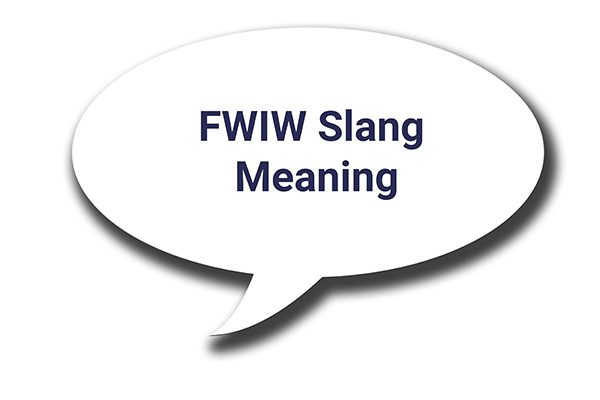
As parents, it can be challenging to keep up with the latest trends, particularly when it comes to online communication. The ever-evolving landscape of internet slang proves a regular stumbling block, but luckily, we’re here to help. Today, we’re going to be looking at a popular initialism that you may have come across – FWIW.
FWIW: Understanding the Slang Meaning
FWIW is an internet abbreviation that stands for 'For What It’s Worth.' It's frequently used to suggest that the information being provided may or may not be useful. It is usually found at the beginning of a sentence, acting as a polite introduction to information the sender wants to share.
Using FWIW: Different Use Cases & Slang Examples
Generally, the use of FWIW is straightforward; however, like many other forms of slang, it can be used sarcastically. Therefore, understanding the context in which it appears is crucial. Consider it the sibling of the ever-popular IMHO (in my humble opinion). Here are a few examples of how your teens might use FWIW:
- “That movie was total nonsense!”
- “Yeah, but FWIW, the special effects were amazing.”
- “I can’t believe I failed the test.”
- “FWIW, almost everyone did, the test was incredibly difficult.”
- “I’m thinking about getting that new video game.”
- “FWIW, I know somebody who has it, and they said it’s not worth the money.”
- “I feel terrible missing Aunt Lily’s birthday party.”
- “FWIW, everyone missed her because her dog was the star of the party.”
Discussing the Use of FWIW with Your Child
Monitoring your child’s use of slang like FWIW can give you valuable insight into their social development and maturity. FWIW and similar phrases suggest your child is learning to express their opinions in a respectful, assertive manner. Clear, thoughtful communication is integral to leadership and success further down the line. Start a conversation with your child about effective communication—both on and offline:
- Ask them about additional phrases they can use to disagree with someone respectfully, without making them defensive.
- Discuss how they adapt their communication to fit different mediums—real-life conversation, video calls, and written messages.
- Encourage them to think about how to convey kindness and calm in their written messages.
- Share experiences where thoughtful communication led to resolution or understanding during a tricky situation.
Stay Ahead with Parentaler's Slang Alert Feature
Keeping up with the latest slang in online communication can be challenging, especially for parents. That's why we've introduced Slang Alert in our Parentaler app – a tool to help you stay aware. With it, customize keywords, receive real-time warnings, and gain contextual understanding. Parentaler's Slang Alert feature sends alerts to parents' phones when their child uses specific monitored slang words.Parenting in a connected world can feel like sailing unknown waters, but with Parentaler, you'll be ahead. Don’t just monitor – understand and participate. Utilize Slang Alert and become the proactive parent your child desires. Join the conversation and enhance your digital parenting with Parentaler.